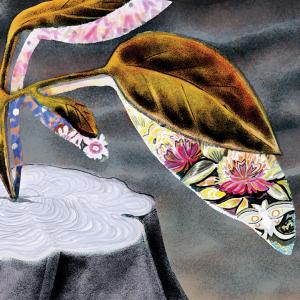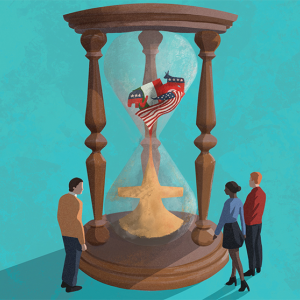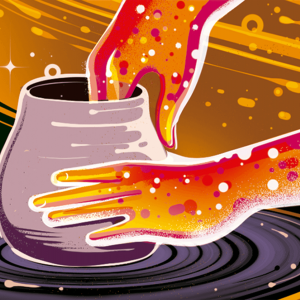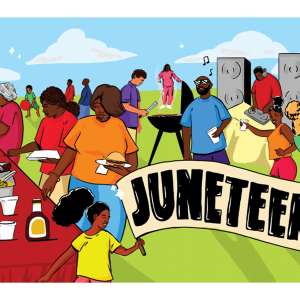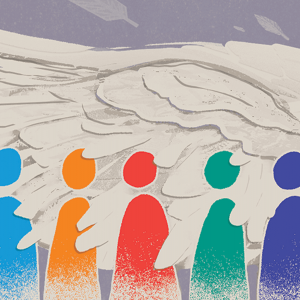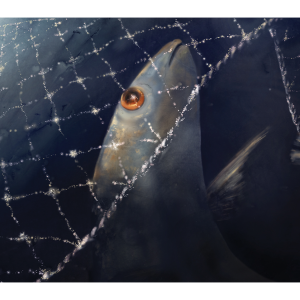
T. Denise Anderson is acting director of Racial Equity and Women's Intercultural Ministries at the Presbyterian Church (U.S.A.) and lives in Maryland.
Posts By This Author
The Joyful Risk of Christmas
December reflections on the Revised Common Lectionary, Cycle A
A FEW YEARS ago, I set out to knit a baby blanket as an Advent prayer practice. Knitting is incredibly meditative and allows me to pray with focus and clarity. Knitting a baby blanket seems appropriate as the church awaits the arrival of the “newborn king.” I wish I could say I finished the blanket in time for Christmas. I did not. However, even that seems appropriate, as so much remains unresolved for Jesus’ community at his birth. Their political occupation continued, and even Jesus’ birth story reflects the impositions placed upon his family by the Roman Empire. God’s inbreaking happens under serious duress — but it happens nonetheless.
My favorite lines from the poem “Christmas is Waiting to be Born” by Howard Thurman are: “Where fear companions each day’s life, / And Perfect Love seems long delayed. / CHRISTMAS IS WAITING TO BE BORN: / In you, in me, in all [hu]mankind.”
Thurman reminds us that God was born into our sorrow and among those who are brokenhearted and struggling. That truth is so important to hold on to as we process years of our own collective trauma. No matter how unresolved things are, Christmas is born in us, too! In December we continue our journey through Advent and arrive at Christmas. We might not have received what we’re waiting for by that time, and very little may make sense. Yet, because of who God is, we open our hearts to the improbable, trusting that we won’t be put to shame.
When Institutions Turn to Dust
November reflections on the Revised Common Lectionary, Cycle C-A.
WE ARE APPROACHING the end of the liturgical year, and the texts have a thread of anticipation running through them. We are deep into the promises conveyed by the prophets and the eschatological vision cast by Jesus. The texts are inviting us to prepare ourselves for something — but what, exactly?
The last Sunday in November, in many traditions, is the Advent Sunday of hope. In biblical Greek, the verb is elpizō (“hope”), which means to wait for salvation with both joy and full confidence. When we hope, we wait not out of boredom or a lack of options but in full confidence that what we are waiting for will arrive. This is the same word used in Hebrews 11:1, “Now faith is the assurance of things hoped for, the conviction of things not seen.” The word “assurance” here can also be translated as “foundation,” as in that of a house. Faith is what anchors our hope into the ground and allows it to stand upright. Faith also often requires that we act before we see. Our hope is first materialized in our faith before it is ever materialized in our reality. Hope pushes us to walk, move, and live as if what we’ve hoped for has already arrived.
Perhaps this moment calls to us to build foundations for the futures we need in defiance of our present realities. Our texts dare us to live into new possibilities, even as our current condition offers far fewer promises.
Creating Tomorrow out of the Wholeness of Today
October reflections on the Revised Common Lectionary, Cycle C.
PUBLIC EDUCATOR AND philosopher Cornel West has spoken about the difference between optimism and hope. Optimism, as he understands it, can point to empirical evidence that suggests things will get better, while hope can exist without any of that. Even when nothing around us points to a bright future, hope defiantly holds on for a better day. Baptist minister and social ethicist Miguel A. De La Torre argues in his book Embracing Hopelessness that hope is often used as a tool of oppression and pacification. For him, hopelessness can be an animating force for justice because a deep enough dissatisfaction with the status quo will move us to change it.
I find resonance and challenge in both of these dear teachers’ perspectives. Very little of our time suggests that things are progressing the way they should. The status quo is untenable and must be changed. Both perspectives remind us not to trust or be satisfied with the way things are. We must find motivation to build the world we need rather than accepting the one we have. For many Christians, October begins with World Communion Sunday and ends with All Hallows’ Eve and Reformation Day. We celebrate our eucharistic ties to Christians around the world, recognize the great cloud of witnesses and saints who have gone before, and commemorate one of the many movements in church history that have pushed us toward something new. We live in a time when very little resembles what we knew just a few years ago. How might our texts help us build for what is coming?
Like a Potter, God Can Reshape Us
September reflections from the Revised Common Lectionary, Cycle C.
IN HER BOOK The Great Emergence, the late Phyllis Tickle pointed out that the church undergoes a “rummage sale” about every 500 years in which dominant forms of its spirituality are displaced from prominence by newer forms of spirituality. It’s much like a purge one would have when decluttering a home or preparing for a move. Older forms of spirituality aren’t done away with; they simply are no longer dominant. New things come to the forefront.
By the fourth century, the locus of Christianity had shifted from ancient Israel and Syria to a Christendom based in European and Western civilization (though a thriving Eastern church remained and does so today). About 40 years ago, another shift occurred. Now there are more Christians in the Global South than in Europe and North America. And Christianity continues to wane in the West. To the extent Christianity has accompanied colonial expansion, I believe this too is a kind of purging. Many of us wrestle with church doctrines and practices that have been in service to domination power for a long time but are untenable in a just world. Who God needs us to be today is markedly different from whom we’ve been in the past.
This month’s texts call to mind the words of the liberation song: “They say that freedom is a constant struggle. Oh Lord, we’ve struggled so long, we must be free, we must be free.” Freedom is not a static destination. Freedom must be maintained, much like the state of a house. Whatever God is calling us toward today, it won’t be necessarily familiar or even pleasant, but it will make us free.
Who Sits At Your Table?
August reflections on the Revised Common Lectionary, Cycle C
YOU, FAITHFUL CHURCH workers, have survived the demands of Lent, Holy Week, Easter, and Pentecost, and I’m willing to wager you are tired. By this time in the liturgical cycle, I’m usually exhausted and my spiritual (and sometimes physical) walk includes a pronounced limp. Vocational and social demands have taken their toll, not to mention the profound collective trauma we have all been through. Two years ago this summer, the waves of direct action in response to the police killings of Breonna Taylor and George Floyd left many of us particularly drained. And the shootings have not stopped. We have all done and been through so much.
Throughout the New Testament, the text refers to faith using the Greek word pistis. That word can also translate as faithfulness, a dogged determination that refuses to acquiesce or let anyone stifle it. It’s the same faith exercised by the woman with the flow of blood and shown in the litany of ancestors in Hebrews 11. It is more than sentimental, and sometimes is best exercised by simply being still and remembering who God is.
Our scriptures this month encourage us to exercise and examine our faith so that we keep going forward, even if we must stop and reset ourselves. Whether our posture is active or passive, our faith is still called into action because the world needs our witness.
Prophets, Losses, and Complex Truths
July reflections on the Revised Common Lectionary, Cycle C.
MY PARENTS WERE raised watching Westerns in which the tropes were all the same: There were “good guys” and “bad guys.” I was raised on Disney movies with similar tropes. There was little moral complexity in these stories, which I suspect reflects our tendency to look at the world in terms of a good/bad dichotomy. Reality is much more nuanced. I appreciate the way that popular 21st-century movies have embraced some of that nuance. One example is the Oscar-winning film Crash, a complex racial narrative released in 2004. An antagonist police officer in the movie’s opening becomes a hero by the end, while his idealistic partner takes the inverse path. It’s never totally apparent who the “villains” and “heroes” are. While I think our investment in the good/bad dichotomy is still substantial, it seems popular culture might agree with the psalmist who says, “there is none who does good” (Psalm 14:3).
Our willingness to accept human complexity is key to our ability to reshape ourselves into more just communities. Today, we see state legislatures seeking to prohibit educators from teaching uncomfortable truths about our country’s past because of the dominant culture’s inability to confront that truth. I remember the words of James Baldwin: “Not everything that is faced can be changed; but nothing can be changed until it is faced.” The scriptures for this month help us change what needs to be changed by facing it and trusting in God’s ability to move us forward.
Carrying the Good News
June reflections on the Revised Common Lectionary, Cycle C.
THE MONTH OF June will require spiritual caregivers to take note of tensions. We begin with the celebration of Pentecost, known as the “birthday of the church,” which will undoubtedly be a day of great joy for the faithful. But later in the month, we mark the grim anniversaries of shootings at Mother Emanuel AME Church in Charleston, S.C., and Pulse nightclub in Orlando, Fla. We will celebrate people who father, and we will wrestle with complicated feelings about the fathers in some of our lives (and even contend with heteropatriarchy in our structures and theology). And we will celebrate the Juneteenth holiday while this nation still incarcerates Black bodies at disproportionate rates and refuses federal protections against voter suppression.
Pentecost invites the church to consider our Spirit-given power to share the gospel, speak with authority to all corners of the earth, and set the captives among us free. It may be that we find ourselves working for equity and liberation harder than we ever have before, and a pandemic has only exacerbated our fatigue. But hopefully this will be an opportunity to go back to the well of the Spirit and draw nourishment for our continued journey. We are not alone, and no one is expected to single-handedly carry the work. The same power that increased the church’s number by 3,000 on its first day is still with us. This, siblings, is good news, because we will need that power for the work we still must do.
God Calls Us to Be Partners, Not Marionettes
May reflections on the Revised Common Lectionary, Cycle C.
TO WHOM DO our lives belong? The Barmen Declaration, written in 1934, was a theological statement by a small group of German Protestants in response to the growing pro-Nazi movement within German Christianity. It stated, “We reject the false doctrine, as though there were areas of our life in which we would not belong to Jesus Christ, but to other lords—areas in which we would not need justification and sanctification through him.” The signers of the Barmen statement said this because the confederation of German Protestant churches (which would eventually become the state church under the Nazi Third Reich) was demanding allegiance to the state in all areas of life and faith. The close of Eastertide gives us an opportunity to consider, in our own time and place, to whom we belong and what that means for how we live now amid echoes of authoritarianism.
In this season, we read of Jesus’ growing influence and what it meant for his disciples to reckon with a world in which resurrection is possible. If the threat of death is muted, if not even prison can contain the good news, then how emboldened will a small-but-mighty movement become in the face of a powerful empire and its proxies? Can this good news still reach us—we who are worn from the immense grief of the last two years? Can we find our second wind to share this good news and build God’s reign? I believe Eastertide has a particular resonance for these times.
Our God Will Not Be Bribed
April reflections on the Revised Common Lectionary, Cycle C.
WE TEND TO approach Lent passively. Some of that is appropriate. After all, we start Lent by putting ashes on our heads to symbolize our grief, and grief often makes us more still. But Lent is a season of intentional activity. To repent is to shift course. We continue to move, but in a different direction. We walk with God, following where God leads, no matter what we must leave behind.
This journey eventually leads to the cross, and later to resurrection. That’s when we find the journey has just begun. We were made to seek God, to question, to be in tension with mystery, to wrestle with God like Jacob, and to eventually find what we’re looking for. And when we come into contact with God in whatever ways are possible, we realize we cannot serve this God as one would serve an idol. We cannot operate out of empty ritual or rote adherence to any custom. We can’t appease or bribe this God. This God is not confined to our shrines, nor does God thrive off our material gifts and sacrifices. What this God wants is much more profound: repentance, trust, and a complete reorientation of one’s heart away from self and toward companionship with God. Many who’ve prepared to walk the Camino de Santiago pilgrimage did so by training on their own trails for months before making the trek. Lent similarly trains us for a lifelong journey of resilience, trust, and resistance to the forces of evil and despair.
Will Lent Reveal Our Authentic Self?
March reflections on the Revised Common Lectionary, Cycle C.
A CURIOUS THING happened among many congregations in my very white denomination after George Floyd was killed: Churches that had been at best timid to enter the work of racial justice dove into it headfirst. Colleagues dusted off their blogs to share their thoughts. Church leaders laced up their sneakers to participate in marches. It appeared that a reckoning had occurred for countless people in the faith. They finally got it and could no longer stay silent, not while a global pandemic amplified the existing inequities in our society. It was time to act.
This would seem like good and right action, except many began this work having previously wounded leaders of color who’d tried for years to call them into it. Worse yet, there was little to no attempt to remedy their errors or circle back with the people they’d hurt. They were eager to move toward action but had to be reminded that the past still needed to be addressed before the future could be entered with justice.
If there is a “right” way to approach Lent, it involves holding our past and future in tension. The Greek words for repentance and reconciliation both connote a reciprocal change. The person on a wayward path makes a U-turn. The transgressor trades places with the transgressed. Our texts challenge us to examine who we have been, are, and are willing to become, because all of it matters to the future we will build.
Awe at God's Big Reveal
February reflections on the Revised Common Lectionary, Cycle C.
EPIPHANY IS NOT an all-at-once revelation of God’s presence with us in the person of Jesus Christ. The entire world was not made aware of Jesus’ arrival at the precise moment it happened. The Magi didn’t make their trek to see the Christ child until he was a toddler. Often Jesus’ own disciples didn’t know who he was when they first encountered him. And little if any positive change occurred in the sociopolitical climate for Israel. The reveal of the Messiah’s identity, and the change that would come with it, happened at a painfully slow pace.
In February, we continue the journey of revelation. We recall stories from the Hebrew Bible and Christian Testament of longing and resignation that give way to revelation and encouragement. We see how the faithful through the ages held onto faith as they faced great threat. We see how, despite the prosperity of the wicked, they somehow recognized the hand of God at work.
Perhaps we find ourselves proclaiming to a people who thought a new administration or other promising change would usher in more favorable conditions. Perhaps we personally struggle with how to hold onto hope, not to mention how to encourage our communities to do it. These Epiphany season texts hold us in our lack of clarity and waning faith, reminding us that we are not alone. While we await a substantive change, may the text in some way help our unbelief.
What God Is Doing in the Shadows
January reflections on the Revised Common Lectionary, Cycle C.
I’M NOT SURE where I thought we would be by now, but I didn’t think we’d be here. A global pandemic has ravaged and killed too many of our loved ones to name, though we could have contained it through collective measures. Climate change continues unabated despite decades of warning and appeal, and we may have missed our window to prevent its worst impacts. We’re experiencing perils that are unnecessary and completely caused by our selective will.
Christmastide and the Epiphany season are opportunities for us to recall and perhaps draw hope from the story of God’s inbreaking into a desperate human condition. But we must also remember that, despite God’s extraordinary proximity to humanity in those days, trouble persisted. Jews were still under a repressive occupying power. They were worshipping in a temple built by a leader invested in his own oppression, put in power by their oppressor. Very little seemed to change. If anything, it appeared to get worse.
As with the people in those times, so it is with us today. We who read the text get a peek behind the veil of worldly power to see what God was doing in the shadows. We see what was obscured from those who cried to their Creator or who’d perhaps run out of tears to shed. We see what they could not see at the time. The preacher and teacher will need to pull back anew this curtain for the people—and for self.
